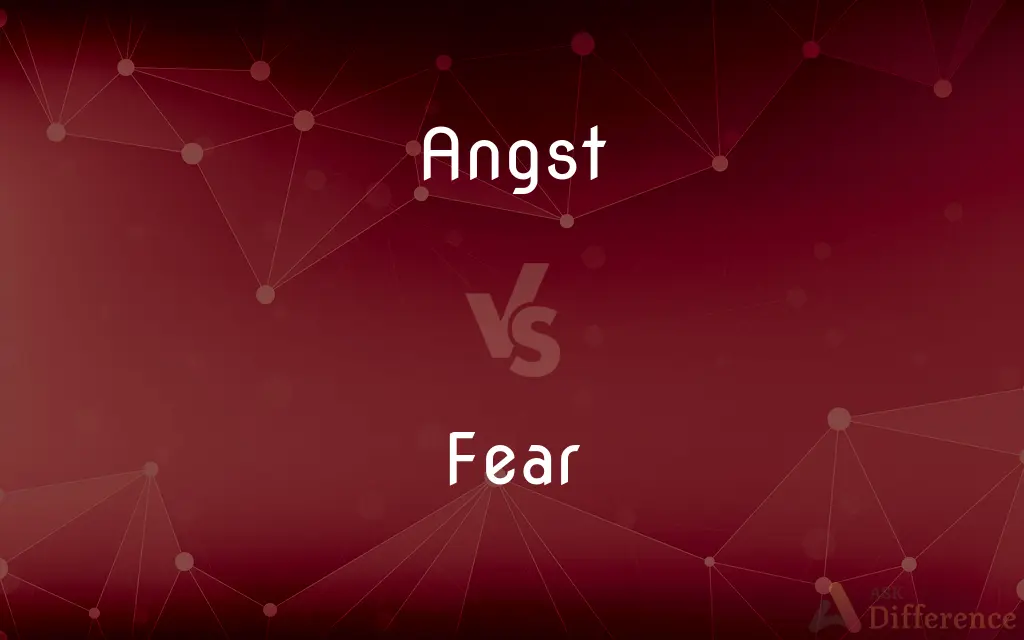Angst vs. Fear — What's the Difference?
By Tayyaba Rehman & Maham Liaqat — Updated on April 26, 2024
Angst is a deep, existential dread or anxiety about life, while fear is a specific, immediate emotional response to a perceived threat.

Difference Between Angst and Fear
Table of Contents
ADVERTISEMENT
Key Differences
Angst is characterized by a profound, often philosophical anxiety about one's life or the human condition in general, suggesting a deeper level of emotional turmoil. Whereas, fear is a direct and immediate emotional response to a recognized external threat, often triggering a fight-or-flight reaction.
In literature and psychology, angst is often associated with existentialist themes, reflecting on feelings of despair, meaninglessness, or disorientation within the world. On the other hand, fear is typically tied to specific stimuli or scenarios, such as fear of heights or fear in dangerous situations, which are concrete and identifiable.
The feeling of angst can be pervasive and lingering, affecting general attitudes towards life and daily behaviors without a clear cause or resolution. In contrast, fear is usually a temporary and acute reaction to a specific situation, which resolves once the threat is removed or escaped from.
Angst is a complex emotional state that can lead to introspection or philosophical exploration, encouraging individuals to confront deeper existential questions about purpose and identity. Conversely, fear is more about immediate survival and safety, focusing the mind and body on responding to immediate dangers.
Comparison Chart
Nature
Existential, philosophical
Immediate, instinctual
ADVERTISEMENT
Trigger
Life, human condition
Specific threats, danger
Duration
Long-term, pervasive
Short-term, situational
Psychological Focus
Self, existence
External environment
Common Contexts
Philosophy, literature
Safety, survival situations
Compare with Definitions
Angst
Angst involves a deep, existential dread about life.
He felt an unshakeable angst about the meaning of life.
Fear
Fear is an immediate emotional response to danger.
She felt a sharp fear when she heard the footsteps behind her.
Angst
Angst can mean a philosophical worry over human existence.
The novel captures the protagonist's angst in a meaningless world.
Fear
Fear serves as a protective reaction to threats.
His fear made him run faster from the bear.
Angst
Angst also denotes inner emotional turmoil without a clear source.
His teenage years were marked by deep angst.
Fear
Fear can also refer to anxiety about specific scenarios.
Her fear of public speaking was evident.
Angst
Angst refers to a profound sense of unease about one's place in the world.
Her angst about the future kept her awake at night.
Fear
Fear is an instinct that aids in survival.
Fear of heights kept him safe on the mountain.
Angst
Angst can express a feeling of existential despair.
She explored her angst through her art.
Fear
Fear often triggers a physical response.
The fear caused his heart to race.
Angst
Angst means fear or anxiety (anguish is its Latinate equivalent, and the words anxious and anxiety are of similar origin). The dictionary definition for angst is a feeling of anxiety, apprehension, or insecurity.
Fear
Fear is an emotion induced by the perception or recognition of phenomena which can pose a danger or threat. Fear causes physiological changes and therefore may produce behavioral changes, such as mounting an aggressive response or fleeing the threat.
Angst
A feeling of anxiety, apprehension, or dread.
Fear
A very unpleasant or disturbing feeling caused by the presence or imminence of danger
Our fears intensified as the storm approached.
Angst
To show or feel anxiety, apprehension, or dread
Angsted over the upcoming exam.
Fear
A state or condition marked by this feeling
Living in constant fear of attack.
Saved as much as he could for fear of losing his job.
Angst
Emotional turmoil; painful sadness.
Fear
A feeling of disquiet or apprehension
A fear of looking foolish.
Angst
A feeling of acute but vague anxiety or apprehension often accompanied by depression, especially philosophical anxiety.
Fear
A reason for dread or apprehension
Being alone is my greatest fear.
Angst
To suffer angst; to fret.
Fear
Extreme reverence or awe, as toward a deity.
Angst
An acute but unspecific feeling of anxiety; usually reserved for philosophical anxiety about the world or about personal freedom
Fear
To be afraid or frightened of
A boy who fears spiders.
Fear
To be uneasy or apprehensive about
We all feared what we would see when the grades were posted.
Fear
To consider probable; expect
I fear you are wrong. I fear I have bad news for you.
Fear
To revere or be in awe of (a deity, for example).
Fear
To be afraid
Your injury is minor. Don't fear.
Fear
To be uneasy or apprehensive
We fear for the future of the business.
Fear
(uncountable) A strong, uncontrollable, unpleasant emotion or feeling caused by actual or perceived danger or threat.
He was struck by fear on seeing the snake.
Fear
(countable) A phobia, a sense of fear induced by something or someone.
Not everybody has the same fears.
I have a fear of ants.
Fear
(uncountable) Terrified veneration or reverence, particularly towards God, gods, or sovereigns.
Fear
(transitive) To be afraid of (something or someone); to consider or expect (something or someone) with alarm.
I fear the worst will happen.
Fear
(intransitive) To feel fear.
Never fear; help is always near.
Fear
To worry about, to feel concern for, to be afraid for.
She fears for her son’s safety.
Fear
(transitive) To venerate; to feel awe towards.
People who fear God can be found in Christian churches.
Fear
(transitive) To regret.
I fear I have bad news for you: your husband has died.
Fear
To cause fear to; to frighten.
Fear
To be anxious or solicitous for.
Fear
To suspect; to doubt.
Fear
(dialectal) Able; capable; stout; strong; sound.
Hale and fear
Fear
A variant of Fere, a mate, a companion.
Fear
A painful emotion or passion excited by the expectation of evil, or the apprehension of impending danger; apprehension; anxiety; solicitude; alarm; dread.
Fear is an uneasiness of the mind, upon the thought of future evil likely to befall us.
Where no hope is left, is left no fear.
Fear
Apprehension of incurring, or solicitude to avoid, God's wrath; the trembling and awful reverence felt toward the Supreme Being.
I will put my fear in their hearts.
I will teach you the fear of the Lord.
Render therefore to all their dues; tribute to whom tribute is due . . . fear to whom fear.
Fear
That which causes, or which is the object of, apprehension or alarm; source or occasion of terror; danger; dreadfulness.
There were they in great fear, where no fear was.
The fear of your adventure would counsel you to a more equal enterprise.
Fear
To feel a painful apprehension of; to be afraid of; to consider or expect with emotion of alarm or solicitude.
I will fear no evil, for thou art with me.
Fear
To have a reverential awe of; to be solicitous to avoid the displeasure of.
Leave them to God above; him serve and fear.
Fear
To be anxious or solicitous for; now replaced by fear for.
The sins of the father are to be laid upon the children, therefore . . . I fear you.
Fear
To suspect; to doubt.
Ay what else, fear you not her courage?
Fear
To affright; to terrify; to drive away or prevent approach of by fear.
Fear their people from doing evil.
Tush, tush! fear boys with bugs.
Fear
To be in apprehension of evil; to be afraid; to feel anxiety on account of some expected evil.
I exceedingly fear and quake.
Fear
An emotion experienced in anticipation of some specific pain or danger (usually accompanied by a desire to flee or fight)
Fear
An anxious feeling;
Care had aged him
They hushed it up out of fear of public reaction
Fear
A profound emotion inspired by a deity;
The fear of God
Fear
Be afraid or feel anxious or apprehensive about a possible or probable situation or event;
I fear she might get aggressive
Fear
Be afraid or scared of; be frightened of;
I fear the winters in Moscow
We should not fear the Communists!
Fear
Be sorry; used to introduce an unpleasant statement;
I fear I won't make it to your wedding party
Fear
Be uneasy or apprehensive about;
I fear the results of the final exams
Fear
Regard with feelings of respect and reverence; consider hallowed or exalted or be in awe of;
Fear God as your father
We venerate genius
Common Curiosities
What is angst?
Angst is a deep, existential feeling of dread or anxiety about life's meaning.
What is fear?
Fear is an emotional response to perceived threats, triggering survival mechanisms.
Can angst cause fear?
Angst can indirectly cause fear, particularly fears related to existential threats or the future.
What are common triggers for fear?
Common triggers for fear include immediate dangers, such as animals, heights, or dark places.
Do children experience angst?
Children can experience a form of angst, especially as they start to understand more about the world and their place in it.
How does one cope with angst?
Coping with angst often involves philosophical reflection, therapy, and exploring personal beliefs.
Can fear be beneficial?
Yes, fear can be beneficial as it prepares the body to face or escape from immediate dangers.
What physiological effects does fear have?
Fear can cause increased heart rate, adrenaline boosts, and heightened senses.
How is angst depicted in art?
Angst is often depicted in art through themes of isolation, despair, and searching for meaning.
Is angst always negative?
While often uncomfortable, angst can lead to personal growth and deeper understanding of oneself.
Share Your Discovery

Previous Comparison
Velvet vs. Fleece
Next Comparison
Porcelain vs. EnamelAuthor Spotlight
Written by
Tayyaba RehmanTayyaba Rehman is a distinguished writer, currently serving as a primary contributor to askdifference.com. As a researcher in semantics and etymology, Tayyaba's passion for the complexity of languages and their distinctions has found a perfect home on the platform. Tayyaba delves into the intricacies of language, distinguishing between commonly confused words and phrases, thereby providing clarity for readers worldwide.
Co-written by
Maham Liaqat













































